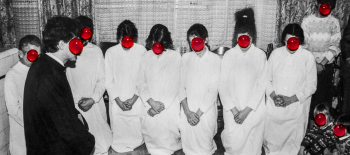The Polish Book Institute, the Polish Cultural Institute London (PCI London), and the Polish Cultural Institute New York (PCI New York) are delighted to announce that Mira Rosenthal has been awarded the 2025 Found in Translation Award (FiTA), for her translation of To the Letter, which was published last year by Archipelago Books.
The last few years have seen an extraordinary selection of outstanding Polish books available in English. The longlist of submitted works this year included Polish classics and contemporary literature, poetry and prose, translations of the highest literary quality, from which it was a real challenge to choose the best.
Grzegorz Jankowicz, director of the Polish Book Institute, commented on Mira Rosenthal’s translation as follows: “It is extremely difficult to translate Różycki’s poems, because all of his linguistic techniques are both subtle and expressive, suggestive thanks to their unobtrusiveness. Mira Rosenthal found an excellent way to do this. I would describe her translation strategy using the following metaphor: consistently developed horizontality.
When reading her translations, I had the impression that someone was taking a panoramic photo with their phone, which means that when moving their hand in a certain direction, they had to keep it within a certain range: from here to there. Let me give you an example. The poem Pokój begins as follows: “Hello? If you can hear me, give a sign, give your voice, raise your tone. / I just wanted to know if it makes any sense”. In Mira Rosenthal’s translation: “Hello? If you can hear me, give a sign, a call, close a tone. I want to know if there’s a meaning”.
Różycki throws in three formulas: the colloquial “give “character”, in which the phraseology “give a hard time”, the impudent (after all, “give a voice” is a command) and metaphorical “hit a tone”. If in the context of a conversation or a call you can hit something, it is rather a telephone number than a tone, but the tone of voice is the most important in this poem, which is why it has to be hit, embedded in something, maybe even embedded in everything. Mira Rosenthal suggests the verb “enclose”, which indicates precisely horizontal movement, but in this case negatively, because it is about capturing, fencing off, surrounding something, as if that tone of voice, or maybe even the entire poem, were to be additionally separated from the communication noise in which we live every day, surrounded to protect it, but also so that we can hide within it, checking whether what we think, do and feel makes sense. A new inspiring trail is found in translation. It is rare for the expression “found in translation” to be so adequate”.
“It is always exciting to watch how a translator gradually penetrates a poet’s work. Mira Rosenthal is an experienced translator of Tomasz Różycki’s work. Thanks to her loyal and beautiful translation of To the Letter, she has managed to achieve an enviable goal, both enabling readers to get to know the poet’s voice, while at the same time creating a work that has gained an independent voice in English,” says Anna Zaranko, winner of the Found in Translation Award 2023 and one of the jurors of the Found in Translation Award 2025 edition, speaking about this year’s award-winning collection.

Alissa Valles, last year’s winner of the Found in Translation Award for her translation of Zuzanna Ginczanka’s Firebird and a juror of FiTA 2025, adds: “In her extraordinary translation, Mira Rosenthal enters the rich world of Tomasz Różycki’s poems and tackles the considerable formal challenges with deep dedication, intelligence, and grace. The poet is very lucky to have found such a translator, and English-speaking readers are very lucky to have gained access to a contemporary poetic project of such stature and beauty.”
Bartek Remisko, curator for literature at the Polish Cultural Institute New York, says:
“Literary translation is always a creative challenge and an intellectual adventure. Translating poetry is even more so, as it involves weighing every word, which must resonate anew in the target language while finding its place within the preservation of the original’s rhythm and rhyme, as in the case of Tomasz Różycki’s poetry. Mira Rosenthal has managed, in an extraordinary way, to capture, in English, not only the Polish resonance of Różycki’s poems but also the multitude of references and contexts embedded within them.”
The collection To the Letter by Tomasz Różycki is yet another recent success of Polish poetry in the demanding English-language market, which is immensely gratifying, as it not only builds its brand but also bodes well for the future interest of English-speaking publishers and readers in the work of contemporary Polish poets.
Tomasz Różycki is one of the most distinctive poetic voices in the Polish language in the 21st century. In his work, the poet references classical authors and high modernism. He is the author of several books, mainly poetry, such as the poems Twelve Stations (2004) and Ijasz (2021), as well as poetry collections Colonies (2005), Letters (2016), and The Beekeeper’s Hand (2022). Two years ago, his novel The Lightbulb Thieves was honored with the prestigious European literary award Grand Continent 2023.
Mira Rosenthal grew up in California. She is the author of the collection Territorial, which was a finalist for the INDIES Book of the Year award, and the collection The Local World, which was honored with the Wick Poetry Prize. She is a recipient of the National Endowment for the Arts Fellowship, the Wallace Stegner Fellowship at Stanford University, and residencies at Hedgebrook and MacDowell. She teaches creative writing at Cal Poly in San Luis Obispo. Among her translations of Polish poetry are Tideline by Krystyna Dąbrowska and Colonies by Tomasz Różycki, which won the Northern California Book Award and were nominated for several other honors, including the International Griffin Poetry Prize and the Oxford Weidenfeld Translation Prize. Rosenthal regularly publishes in respected journals, including Poetry, Ploughshares, The New York Review of Books, Harvard Review, PN Review, Threepenny Review, A Public Space, and Oxford American. She served for five years on the board of the American Literary Translators Association (ALTA).
Previously awarded:
2008 – Bill Johnston for his translation of New Poems by Tadeusz Rózewicz, Archipelago Books, 2007;
2009 – Antonia Lloyd-Jones for her translation of The Last Supper by Pawel Huelle, Serpent’s Tail, 2008;
2010 – Danuta Borchardt for her translation of Pornografia by Witold Gombrowicz, Grove Press, 2009;
2011 – Clare Cavanagh & Stanislaw Barańczak for their translation of Here by Wisława Szymborska, Houghton Mifflin Harcourt, 2010;
2012 – Joanna Trzeciak for her translation of Sobbing Superpower by Tadeusz Rózewicz, W. W. Norton & Company, 2011;
2013 – Antonia Lloyd-Jones for the entire work of translations in 2012;
2014 – Philip Boehm for his translation of Chasing the King of Hearts by Hanna Krall, Peirene Press, 2013;
2015 – Ursula Phillips for her translation of Choucas by Zofia Nalkowska, Northern Illinois University Press, 2014;
2016 – Bill Johnston for his translation of Twelve Stations by Tomasz Rózycki, Zephyr Press, 2015;
2017 – Piotr Florczyk for his translation of Building the Barricade by Anna Świrszczyńska, Tavern Books, 2016;
2018 – Jennifer Croft for her translation of Flights by Olga Tokarczuk, Fitzcarraldo Editions (UK) and Riverhead Books (US), 2017;
2019 – Madeline G. Levine for her translation of Collected Stories by Brunon Schulz, Northwestern University Press, 2018;
2020 – Anna Zaranko for her translation of The Memoir of an Anti-hero by Kornel Filipowicz, Penguin Modern Classics, 2019;
2021 – Ewa Malachowska-Pasek and Megan Thomas for their translation of The Career of Nicodemus Dyzma by Tadeusz Dolęga-Mostowicz, Northwestern University Press, 2020;
2022 – Jennifer Croft for her translation of The Books of Jacob by Olga Tokarczuk, Fitzcarraldo Editions (UK) 2021, Riverhead Books (US), 2022;
2023 – Anna Zaranko for her translation of The Peasants by Władysław Reymont, Penguin Classics, 2022;
2024 – Alissa Valles for her translation of Firebird by Zuzanna Ginczanka, The New York Review of Books, 2023.
***
About FiTA
The award was established in 2008. It is given every year to an author/author of the best translation of Polish literature into English that was published in book form in the previous calendar year. The award is a one-month residency stay in Kraków, Poland with a monthly stipend of 2,000 PLN, a flight to and from Kraków and a prize of 16,000 PLN.
The award is given by a jury consisting of representatives of The Polish Book Institute Warsaw / Kraków, The Polish Cultural Institute London, and The Polish Cultural Institute New York, as well as translators, the winners of its two previous editions.
***
More information about the award: Maria Rutkowska
e-mail: m.rutkowska@instytutksiazki.pl with FOUND IN TRANSLATION AWARD in the subject line



